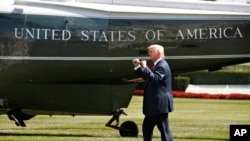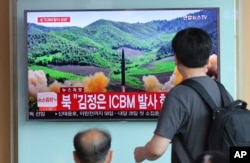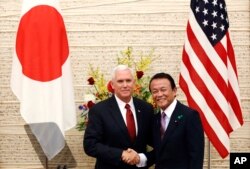U.S. President Donald Trump on Monday told reporters "we'll take a look" at visiting the Korean Demilitarized Zone during his planned five-nation Asian trip next month.
South Korean media have speculated that Trump could go to the heavily-armed DMZ, the narrow strip of land separating South and North Korea that provides a vantage point looking into the reclusive and isolated nation.
Trump did not directly answer whether such a visit — similar to the one Vice President Mike Pence made in April — would be seen as provocative by the North Koreans.
"Every American president has visited the DMZ, and President Trump should, too," said a former U.S. ambassador to South Korea and assistant secretary of state, Christopher Hill.
Hill, now dean of the Korbel School of International Studies at the University of Denver, added that "timing is also something to weigh."
Ned Price, a former National Security Council senior director and assistant to President Barack Obama agreed, saying "the North Koreans would interpret any visit as provocative."
Price told VOA that what the president says or does while at the DMZ "would determine just how the North Koreans react. Any blustery language — such as what we've seen in recent weeks — would be hugely detrimental to the cause of a diplomatic de-escalation."
Trump, during his upcoming trip to Asia, is looking to ramp up pressure against North Korea's nuclear weapons development, but also promote American economic interests in the region.
Trump has marshaled international support at the United Nations for economic sanctions against North Korea intended to deprive Pyongyang of export money to fund its nuclear weapons program. But North Korean leader Kim Jong Un has continued nuclear and ballistic missile tests, certain to be a focal point of Trump's talks with Japanese Prime Minister Shinzo Abe, South Korean President Moon Jae-in and Chinese President Xi Jinping.
Retired U.S. General Jack Keane, a former Army Vice Chief of Staff with close ties to the Trump administration, told VOA's Korean Service that if Pyongyang aims nuclearized intercontinental ballistic missiles ((ICBM)) at America and its Pacific territories, which include Guam, it would not be unrealistic for Washington to launch pre-emptive strikes against the isolated regime.
Keane said President Trump will consider that "an act of war" by the North. "We can say that war on the peninsula is not realistic," Keane said, "but if Kim Jong Un is going to bring it to that point, that is what is going to exactly happen."
The White House said Monday that Trump's trip from November 3 to 14 will include stops in Japan, South Korea, China, Vietnam and the Philippines. The president is to hold talks with the heads of state at each stop. The president will also meet Japanese Emperor Akihito on November 6, as well as play a round of golf with Prime Minister Shinzo Abe.
In Seoul, Trump is also to speak to South Korea's National Assembly.
In Japan November 5, Trump is meeting with American and Japanese service members and will hold talks with Abe, who is also hosting him for a meeting with families of Japanese nationals who have been abducted by the North Korean regime.
After the visit to South Korea, Trump heads to Beijing for his meeting with Xi, whom he has often praised for his attempts to curb North Korea's weapons development, as well as commercial and cultural events.
Trump's fourth Asian stop is in Danang, Vietnam, on November 10, where he is to meet regional leaders at the Asia-Pacific Economic Cooperation (APEC) summit and deliver a speech.
The White House said Trump will lay out "the United States' vision for a free and open Indo-Pacific region and underscore the important role the region plays in advancing America's economic prosperity."
But Trump could face sharp questions about why he pulled the U.S. from the 12-nation Trans-Pacific Partnership, a free trade deal that was years in the making and promoted, along with Japan, by former President Barack Obama as beneficial for businesses, workers and consumers.
Trump has said he favors one-on-one trade deals with other countries.
Officials from Tokyo are currently in Washington looking for a way forward on bilateral and regional trade.
Pence, on Monday, met Japan's deputy prime minister Taro Aso, also the finance minister, for the second round of the U.S.-Japan Economic Dialogue.
"We believe this dialogue has the potential to significantly deepen our bilateral economic ties and produce jobs, prosperity and growth on both sides of the Pacific," Pence said.
The vice president added the dialogue is focused on "a common strategy on trade and investment rules and issues to ensure a free and fair trading relationship between our two nations."
Also attending the meeting with the Japanese officials were Treasury Secretary Steven Mnuchin, Commerce Secretary Wilbur Ross, U.S. Trade Representative Robert Lighthizer and the U.S. Ambassador to Japan, William Hagerty.
Trump on Monday left doubt as to whether he will visit the Philippines, which is the last country on his November itinerary in Asia.
"We've been invited to the Philippines, so I may be going to the Philippines," Trump said.
Trump is scheduled to meet Philippine President Rodrigo Duterte, whose bloody crackdown on drug dealers has been condemned by some U.S. officials and much of the international community. But Trump, in an April phone call with Duterte, praised him for the "unbelievable job on the drug problem" he had launched in the island nation.






